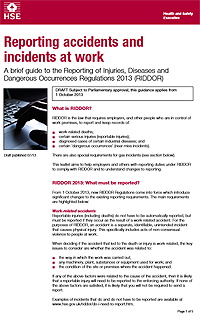 |
|
|
From 1 October 2013, the guidance in the 2013 revision of INDG453 will apply. A draft version of this revision is available for download from the E-Library Database.
The HSE has issued a press release regarding the changes, and of course; it promotes the changes as a good thing.
However, re-classification of what they call ‘major injuries’ has been the centre of the changes and the removal of the need to report all ‘dangerous occurrences’.
This is because the Government considers that reporting all dangerous occurrences is of no value and bogs down business in ‘Red Tape’!
Further removing the requirement to report accidents resulting in 3 days absence or more, whilst still requiring it to be recorded makes no sense, and will result in the majority of employers encouraged not to bother. Requiring recording whilst doing nothing with the information will be seen by many employers as ‘Red Tape’.
RIDDOR requires employers, and anyone else with responsibility for health and safety within a workplace, to report
and keep records of:
 work-related deaths work-related deaths- serious injuries
- cases of diagnosed industrial disease
- certain ‘dangerous occurrences (near miss accidents)
So just what is changing in RIDDOR from October 2013?
The main changes are to simplify the reporting requirements in the following areas:
- The classification of ‘major injuries’ to workers is being replaced with a shorter list of ‘specified injuries’
- The existing schedule detailing 47 types of industrial disease is being replaced with eight categories of reportable work-related illness
- Fewer types of ‘dangerous occurrence’ will require reporting
There are no significant changes to the reporting requirements for:
- Fatal accidents
- Accidents to non-workers (members of the public)
- Accidents which result in the incapacitation of a worker for more than seven days
Recording requirements will remain broadly unchanged, including the requirement to record accidents resulting in the incapacitation of a worker for more than three days.
Source: HSE / Unionsafety
|
|
|
Designed, Hosted and Maintained by Union Safety Services
|